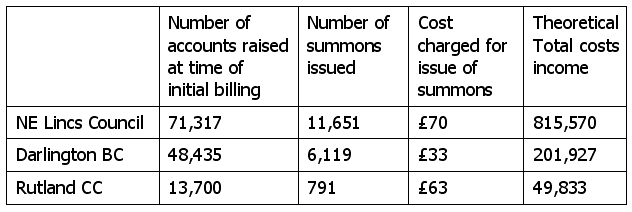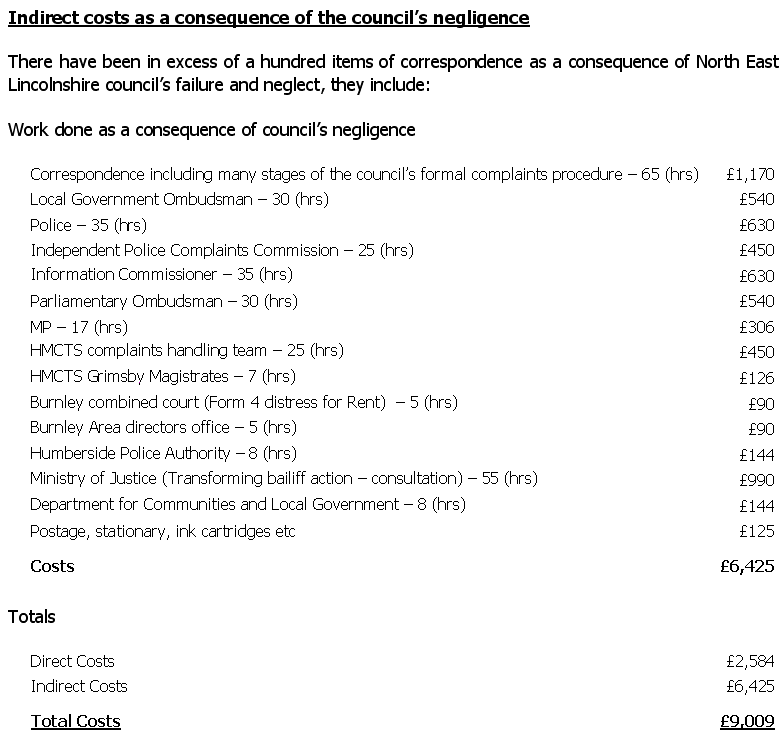Re: Council Tax Liability Order Applications Court Costs – Test Case
North East Lincolnshire Council
Civic Offices Knoll Street
North East Lincolnshire
DN35 8LN
Ref: NG/CTR/12912
01 October 2012
Dear Ms ......
Re: Council Tax Reminder, Summons and Recovery – Account 550xxxxxxx
This letter will outline the concerns raised in my 28 September correspondence relating to Control & Monitoring. As mentioned, if any element of these costs is claimed with regards monitoring liability order applications, it will without doubt be done under false pretences.
It is a legal requirement for the council’s collection team to check the accuracy of all accounts before processing them to the enforcement stage. There is overwhelming evidence that the council does not meet this obligation. Data supplied by the council which relates to liability orders covering a five year period provides evidence that neither the local authority nor Magistrates’ court are monitoring liability order applications.
– 6,580 Liability Orders were issued for an initial debt of less than £100.
– For a debt less than £25 the number issued was 1,387. For outstanding balances under £15 the figure was 544, and 45 accounted for debts less than £5.
– 3 Liability Orders were even issued for an initial debt of only 1 penny.
Over this period, a total 3,528 Liability Orders were issued for initial debt of £50 or less. The authority has stated that the council's collection team checks the accuracy of all accounts before passing them to the enforcement stage and accounts are only progressed to enforcement for amounts over £50.
Against the council’s own guidelines, 3,528 householders incurred court penalties that shouldn’t have. They would then be subjected to having their possessions seized by bailiffs and incurring further extortionate fees.
The financial benefit for letting these cases progress to enforcement is obvious. The court is paid for each application the council makes. It therefore makes financial sense for it to turn a blind eye and authorise applications and grant the orders.
Whether or not orders are sought purposely to generate income is a matter in itself for investigation, though what is relevant here is the negligence of both the council and court staff who review these cases. The point being that the annual £101,400 attributable to ‘Control & Monitoring’ will be costs claimed under false pretences as there clearly is no effective monitoring of liability order applications.
The case between "Regina v. Brentford Justices, Ex parte Catlin" made a point that "a decision by magistrates whether to issue a summons pursuant to information laid, involves the exercise of a judicial function, and is not merely administrative."
Lord Chief Justice, Lord Widgery stated that:
There clearly then, exists in these liability order applications, at least a dereliction of duty, when so many are granted for insignificant amounts. Many of which would likely have originated from administration errors or oversight rather than non-payment. Whatever the cause, these small debts certainly don't warrant being grossly inflated by council's court costs and bailiff fees.
Defective Summons Documents
More evidence in this example reinforces the assertion that no Control & Monitoring exists in the liability order applications.

Having authorisation from the Magistrates’ court, the council’s recovery department sent out 3,361 flawed summonses containing incorrect and out of date information relating to costs for obtaining a liability order. The orders were for non-payment of either council tax or NNDR, with all alleged debtors scheduled to attend the same hearing of 2 June 2011.
Of greater concern is the Magistrates’ court had been informed by the council, in writing, that from 1 April 2011 it would be changing the composition of the costs by increasing the summons and no longer imposing £25 costs for obtaining the liability order – see September 17 letter.
The Magistrates courts' Legal Adviser is required to review applications which should have already been checked by the council's recovery staff beforehand. However, this had not prevented more than 3,000 of the defective summonses being sent out unnoticed to residents, stating that the council would apply for further costs of £25 if a liability order was granted. The obvious errors going unnoticed brings into question whether either of these procedures had even taken place.
Data obtained covering the five year period suggests it unlikely that any monitoring ever takes place.
A total £182,140 was incurred by 2,602 householders who were liable for the penalties in connection with a single council tax liability order hearing.
These court costs and any enforcement fees as a result of the recovery should not have been imposed. Firstly because the paperwork was flawed and secondly, it is unlikely applications had been checked by the council or reviewed by the court. Or, if they had this was done negligently.
In connection with enforcement, and as a follow-up to liability orders being issued by the Grimsby Magistrates’ Court on 2nd June 2011, the council had to re-send 2,207 letters which were sent out on the 3 June 2011. These documents, like the 3,361 summonses, were defective. If it was deemed necessary by the council to make corrections to these, then the summonses should have also been corrected and re-sent.
None of these defective summonses were corrected and re-sent when the council learned they were defective nor was any compensation made to residents in respect to costs incurred from this flawed judicial process.
Yours sincerely
North East Lincolnshire Council
Civic Offices Knoll Street
North East Lincolnshire
DN35 8LN
Ref: NG/CTR/12912
01 October 2012
Dear Ms ......
Re: Council Tax Reminder, Summons and Recovery – Account 550xxxxxxx
This letter will outline the concerns raised in my 28 September correspondence relating to Control & Monitoring. As mentioned, if any element of these costs is claimed with regards monitoring liability order applications, it will without doubt be done under false pretences.
It is a legal requirement for the council’s collection team to check the accuracy of all accounts before processing them to the enforcement stage. There is overwhelming evidence that the council does not meet this obligation. Data supplied by the council which relates to liability orders covering a five year period provides evidence that neither the local authority nor Magistrates’ court are monitoring liability order applications.
– 6,580 Liability Orders were issued for an initial debt of less than £100.
– For a debt less than £25 the number issued was 1,387. For outstanding balances under £15 the figure was 544, and 45 accounted for debts less than £5.
– 3 Liability Orders were even issued for an initial debt of only 1 penny.
Against the council’s own guidelines, 3,528 householders incurred court penalties that shouldn’t have. They would then be subjected to having their possessions seized by bailiffs and incurring further extortionate fees.
The financial benefit for letting these cases progress to enforcement is obvious. The court is paid for each application the council makes. It therefore makes financial sense for it to turn a blind eye and authorise applications and grant the orders.
Whether or not orders are sought purposely to generate income is a matter in itself for investigation, though what is relevant here is the negligence of both the council and court staff who review these cases. The point being that the annual £101,400 attributable to ‘Control & Monitoring’ will be costs claimed under false pretences as there clearly is no effective monitoring of liability order applications.
The case between "Regina v. Brentford Justices, Ex parte Catlin" made a point that "a decision by magistrates whether to issue a summons pursuant to information laid, involves the exercise of a judicial function, and is not merely administrative."
Lord Chief Justice, Lord Widgery stated that:
....before a summons or warrant is issued the information must be laid before a magistrate and he must go through the judicial exercise of deciding whether a summons or warrant ought to be issued or not. If a magistrate authorises the issue of a summons without having applied his mind to the information then he is guilty of dereliction of duty and if in any particular justices' clerk's office a practice goes on of summonses being issued without information being laid before the magistrate at all, then a very serious instance of maladministration arises which should have the attention of the Authorities without delay....
Defective Summons Documents
More evidence in this example reinforces the assertion that no Control & Monitoring exists in the liability order applications.

Having authorisation from the Magistrates’ court, the council’s recovery department sent out 3,361 flawed summonses containing incorrect and out of date information relating to costs for obtaining a liability order. The orders were for non-payment of either council tax or NNDR, with all alleged debtors scheduled to attend the same hearing of 2 June 2011.
Of greater concern is the Magistrates’ court had been informed by the council, in writing, that from 1 April 2011 it would be changing the composition of the costs by increasing the summons and no longer imposing £25 costs for obtaining the liability order – see September 17 letter.
The Magistrates courts' Legal Adviser is required to review applications which should have already been checked by the council's recovery staff beforehand. However, this had not prevented more than 3,000 of the defective summonses being sent out unnoticed to residents, stating that the council would apply for further costs of £25 if a liability order was granted. The obvious errors going unnoticed brings into question whether either of these procedures had even taken place.
Data obtained covering the five year period suggests it unlikely that any monitoring ever takes place.
A total £182,140 was incurred by 2,602 householders who were liable for the penalties in connection with a single council tax liability order hearing.
These court costs and any enforcement fees as a result of the recovery should not have been imposed. Firstly because the paperwork was flawed and secondly, it is unlikely applications had been checked by the council or reviewed by the court. Or, if they had this was done negligently.
In connection with enforcement, and as a follow-up to liability orders being issued by the Grimsby Magistrates’ Court on 2nd June 2011, the council had to re-send 2,207 letters which were sent out on the 3 June 2011. These documents, like the 3,361 summonses, were defective. If it was deemed necessary by the council to make corrections to these, then the summonses should have also been corrected and re-sent.
None of these defective summonses were corrected and re-sent when the council learned they were defective nor was any compensation made to residents in respect to costs incurred from this flawed judicial process.
Yours sincerely







Comment